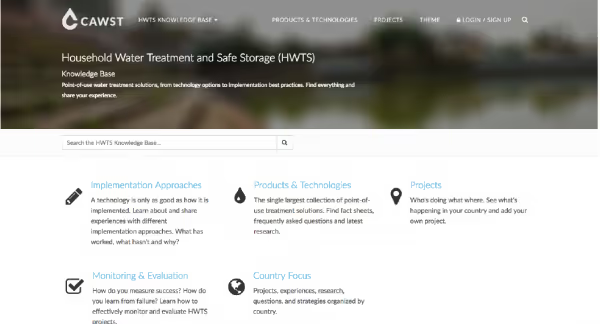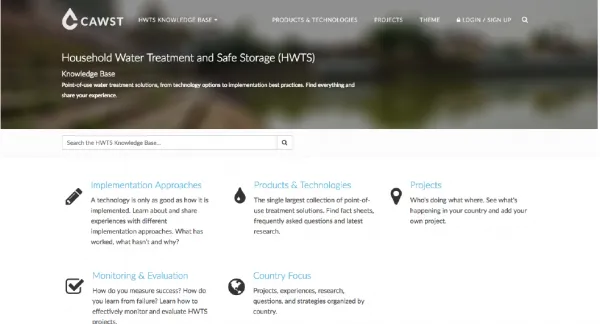Household Water Treatment and Safe Storage Knowledge Base

Thanks to the support of the Elrha Humanitarian Innovation Fund - CAWST is developing the next phase of its HWTS Knowledge Base, a web-based knowledge and technical support hub on household water treatment and safe storage (HWTS) solutions for Water, Sanitation and Hygiene (WASH) practitioners.
An open space to collaborate on HWTS knowledge
At CAWST, we have deep-set conviction and commitment to build knowledge and make it openly available. The HWTS Knowledge Base project is a space for collaboration and openness, providing practical information that is easy to understand, applicable and familiar to local contexts across the globe.
Now available in its first release, the HWTS Knowledge Base is designed as a one-stop, interactive online space with subject-specific structured information on point-of-use water treatment solutions. With the support of HIF, its next release will provide additional features to support humanitarian WASH practitioners, including those of you working in pre-, active- and post-emergency settings.
The humanitarian need
More than 1.8 billion people are drinking fecally contaminated water, while 2.4 billion people lack access to basic sanitation. Making inroads in this humanitarian issue requires unprecedented breadth and depth of collaboration.
Knowledge of the current and historical implementation of HWTS in specific regions prior to an emergency is often limited to those with an already established presence. During emergency response, there is an influx of organizations that were not previously active in the region, who therefore do not have prior knowledge of HWTS implementation in the region. This readily available information hub on contextually appropriate technologies and approaches will serve as a key resource for emergency response and recovery efforts in affected populations.
[caption id=attachment_7662" align="alignnone" width="600"]

The HWTS Knowledge Base is designed as a one-stop, interactive online space with subject-specific structured information on point-of-use water treatment solutions. With the support of HIF, its next release will provide additional features to support humanitarian WASH practitioners, including those of you working in pre-, active- and post-emergency settings.[/caption]
The stage is set for you
The HWTS Knowledge Base is up and running. At the onset, CAWST has shared our base of education and training resources related to HWTS, and the network of HWTS implementers who access them. To date, 1,800 organizations from 150 countries have downloaded materials more than 19,000 times from our existing open-content base of HWTS-related education and training resources. CAWST will host, manage and moderate content, as well as develop, monitor and adapt the platform’s features, user interface and content.
We invite you to share your HWTS experience
Sharing information and experience on point-of-use water treatment solutions, from technology options to implementation experiences in HWTS, is a great step forward to build a world where people have the opportunity to succeed because their safe drinking water and basic sanitation needs have been met.
Through the HWTS Knowledge Base, you will have the opportunity to showcase your project implementation work and provide information to feed into sector- and country-level learning. This increased level of knowledge and stronger network amongst HWTS implementers and researchers will support practitioners to plan and deliver more successful projects that incorporate appropriate technology choices, tried and tested implementation models, and shared learnings. Improved HWTS implementation will lead to a higher rate of correct, consistent and continued use of HWTS products by vulnerable populations, and ultimately to improved health in vulnerable communities.
Your contributions and engagement will collectively shape the HWTS Knowledge Base into a comprehensive, practical and relevant online tool.
Spanning the emergency-development continuum, the Knowledge Base will have six main content types integrated throughout its online platform:
• HWTS Products and Technologies, including filter and non-filter options
• HWTS Implementation Approaches and experiences
• Monitoring and Evaluation Approaches for HWTS
• Global Mapping Tool of Existing HWTS Technology Implementation (projects and initiatives, including what technologies and by whom)
• Country-Specific Information integrating information on existing technologies, implementation and M&E approaches, and relevant country strategies, policies, and regulations.
• A discussion-style commenting feature to provide a space for users to comment on any content item in the Knowledge Base
Great to meet you!
As an engineer with both WASH technical experience in emergencies and an experienced web-based system developer, I am leading the web development of the HWTS Knowledge Base project, and will provide support to its project manager.
It is my pleasure to introduce you to Laura MacDonald, who is part of our Research Learning team at CAWST. Laura is managing the HWTS Knowledge Base project and leading its content she will be updating you on its progress through future blog posts. She is currently completing her doctoral dissertation in the Department of Geography and Environmental Engineering at Johns Hopkins University, researching the innovation-development process of HWTS as a concept in scientific literature, as a technology, and as a policy.
Laura and I will also be sharing the outcomes of this initiative through the WHO Network for the promotion of HWTS, offering updates at upcoming WASH conferences.
You can reach our project team through the HWTS Knowledge Base online chat or emailing us at [email protected]. We look forward to our conversations!
Olivier Mills, M.Eng., M.Sc., Director of Communications at CAWST
Stay updated
Sign up for our newsletter to receive regular updates on resources, news, and insights like this. Don’t miss out on important information that can help you stay informed and engaged.
Related articles


.png)
Explore Elrha
Learn more about our mission, the organisations we support, and the resources we provide to drive research and innovation in humanitarian response.